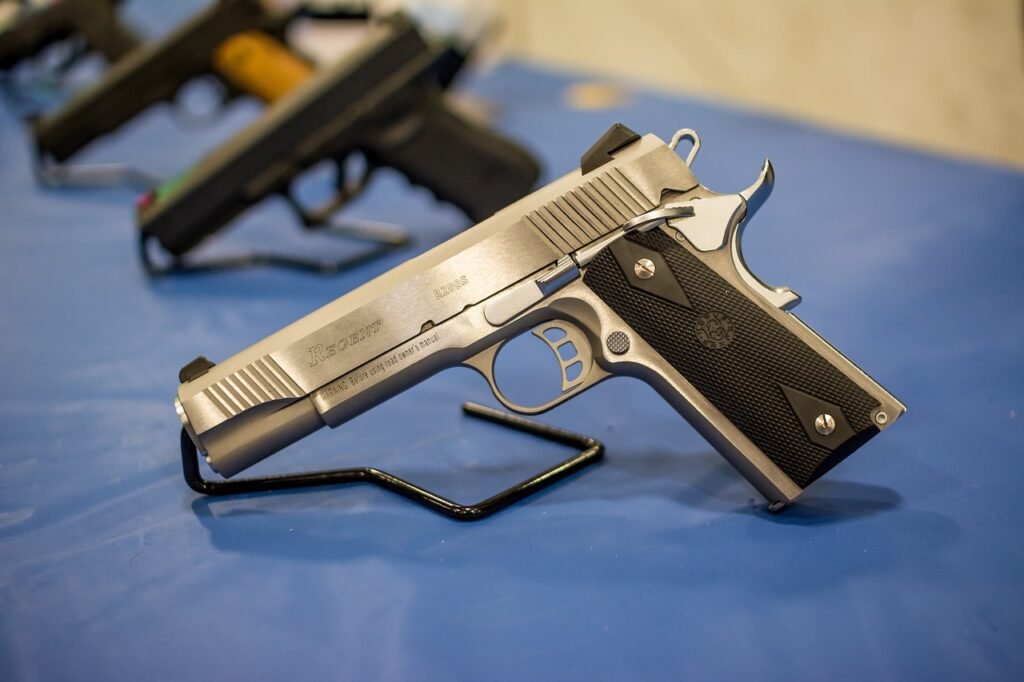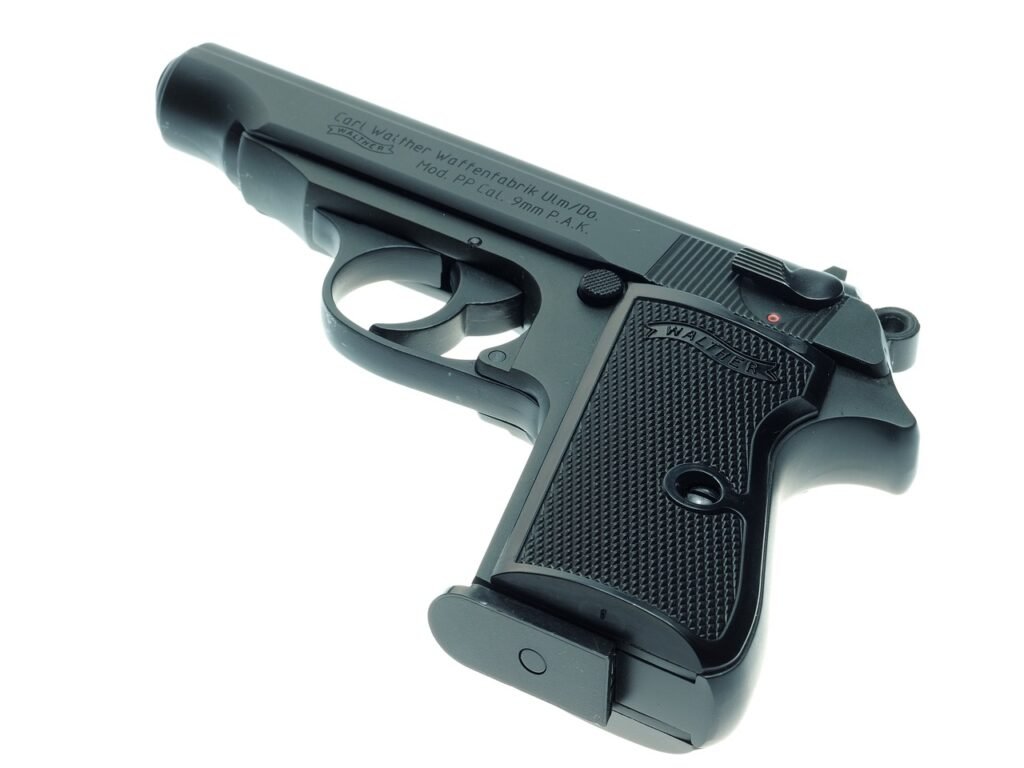So, you’ve just purchased a handgun, and now you’re wondering about the legal requirements for its storage. It’s important to know and understand these regulations to ensure that you are in compliance with the law and are keeping yourself and others safe. In this article, we’ll explore the legal requirements for handgun storage, providing you with the information you need to store your firearm responsibly and in accordance with the law. Let’s dive into it!

This image is property of pixabay.com.
State-specific regulations
Overview of state laws
When it comes to handgun storage, it is important to understand that the regulations vary from state to state. Each state has its own set of laws and requirements regarding the safe storage of firearms. It is crucial to be aware of these regulations in order to comply with the law and ensure the safety of yourself and others.
Researching state-specific regulations
To find out the specific regulations for handgun storage in your state, it is recommended to research and familiarize yourself with the laws in your area. You can start by visiting the official government websites that provide information on firearm laws. These websites often have a dedicated section where you can find the specific regulations for handgun storage.
Exceptions and variations
While each state has its own regulations, it is also important to note that there may be exceptions and variations within those regulations. Some states may have additional requirements or exemptions based on certain circumstances. It is crucial to thoroughly understand all the relevant regulations applicable to your specific situation to ensure compliance and safety.
Safe storage requirements
Definition of safe storage
Safe storage refers to the proper and secure storage of handguns to prevent unauthorized access and use. The purpose of safe storage requirements is to reduce the risk of accidents, theft, and misuse of firearms, especially in households with children or individuals who may pose a danger to themselves or others. Safe storage typically involves using locking mechanisms and storing firearms in secure containers.
Locking mechanisms
One of the most common requirements for safe handgun storage is the use of locking mechanisms. These mechanisms can include trigger locks, cable locks, or locking devices specifically designed for firearms. Locking mechanisms help prevent unauthorized access to the handgun and ensure that it remains securely stored when not in use.
Storage location
Another important aspect of safe storage is determining the storage location for handguns. Many states require firearms to be stored in a location that is inaccessible to unauthorized individuals, especially children. This may include using locked cabinets, safes, or other secure storage containers. The storage location should be chosen in a way that minimizes the chances of accidents or unauthorized access.
Proximity to ammunition
In addition to the storage location, some states have regulations regarding the proximity of handguns to ammunition. It is important to familiarize yourself with these regulations to ensure compliance with the law. Storing ammunition separately from firearms can help minimize the risk of accidental discharge or misuse.
Secure storage containers
Many states require firearms to be stored in secure containers when not in use. These containers should be designed to prevent unauthorized access and protect the handgun from damage. Secure storage containers can include gun safes, lockboxes, or cases specifically designed for firearms. It is important to choose a container that meets the standards set by your state’s regulations.
Approved storage devices
Some states may have a list of approved storage devices that meet the specific requirements for safe handgun storage. These devices may undergo testing and certification to ensure their effectiveness in preventing unauthorized access. It is important to check if your state has any approved storage devices and choose one that complies with the regulations.
Compliance with local ordinances
Apart from state laws, it is also important to comply with local ordinances when it comes to handgun storage. Some cities or counties may have additional requirements or restrictions regarding safe storage. It is essential to research and understand both state and local regulations to ensure full compliance with the law.

This image is property of pixabay.com.
Transportation regulations
Transportation methods
When transporting handguns, it is important to follow the transportation regulations set by your state. Different states may have different requirements regarding how handguns should be transported. Some common transportation methods include carrying the handgun in a locked container or using a holster specifically designed for secure transportation. It is important to familiarize yourself with the regulations in your state and choose a transportation method that complies with the law.
Traveling across state lines
If you are traveling across state lines with a handgun, it is crucial to understand the transportation regulations of both your departure and destination states. Some states may have different requirements or restrictions on transporting firearms. It is your responsibility to ensure that you are in compliance with the laws of all the states through which you are traveling.
Vehicle storage requirements
When storing handguns in a vehicle, it is important to follow the storage requirements set by your state. Some states may require handguns to be stored in a locked compartment or container that is separate from the ammunition. It is crucial to understand and adhere to these regulations to ensure safe and legal storage of handguns in your vehicle.
Concealed carry considerations
If you have a concealed carry permit, it is necessary to understand the regulations and requirements for safe storage of handguns while carrying them. Many states have specific rules regarding the storage of handguns in public places or when not actively carrying. It is important to know and follow these regulations to avoid legal consequences and ensure the safety of yourself and others.
Temporary storage during transportation
There may be instances when you need to temporarily store a handgun while traveling or during transportation. It is important to understand the regulations regarding temporary storage in your state. Some states may allow the storage of a handgun in a locked container or the trunk of a vehicle, while others may have different requirements. Familiarize yourself with the regulations to ensure compliance and safe temporary storage.
Child access prevention laws
Background and purpose
Child access prevention laws are put in place to ensure the safety of children by imposing specific requirements on the safe storage of handguns. These laws aim to reduce the risk of accidents and unintended harm that can occur when children gain access to firearms. Understanding and complying with child access prevention laws is crucial for responsible handgun owners.
Defining child access prevention
Child access prevention laws typically define what constitutes proper storage and what measures must be taken to prevent access to handguns by children. These laws may require firearms to be stored in a manner that makes them inaccessible to children, such as using secure storage containers or locking mechanisms. It is important to familiarize yourself with the specific requirements in your state and follow them accordingly.
Liability for improper storage
In the case of improper storage of handguns resulting in harm caused by a child, the individual who failed to secure the firearm may be held liable. Negligent storage may result in criminal charges or civil lawsuits if it is determined that the failure to properly secure the handgun led to harm or injury. Understanding the potential legal consequences of improper storage emphasizes the importance of complying with child access prevention laws.
Exceptions and penalties
While child access prevention laws aim to prevent accidental harm, there may be exceptions and penalties based on specific circumstances. Some states may have exceptions for temporary storage or may impose different penalties for non-compliance with the law. It is crucial to thoroughly understand the regulations in your state and comply with them to ensure the safety of children and avoid legal repercussions.

This image is property of pixabay.com.
Firearm storage in homes
Securing firearms in residences
Properly securing firearms in residences is essential for the safety of everyone in the household. Following safe storage practices can help prevent accidents, unauthorized access, and even theft. Securely storing firearms in your home is not only a responsible action but also a legal requirement in many states.
Safe storage options
There are several safe storage options to consider when securing firearms in residences. Gun safes, lockboxes, and locking cabinets are popular choices. These storage options provide a higher level of security as they are designed to prevent unauthorized access. It is important to choose a safe storage option that is both secure and easy for you to access in case of an emergency.
Firearm locking devices
Firearm locking devices, such as trigger locks or cable locks, add an additional layer of security to your firearms. These devices prevent the handgun from being fired and make it more difficult for unauthorized individuals, especially children, to access the firearm. It is important to use locking devices that are approved by your state and properly secure the firearm as required by the law.
Strategies to prevent theft
Preventing theft of firearms is a crucial aspect of firearm storage in homes. This can be achieved by implementing strategies such as keeping firearms out of sight, properly securing safes or storage containers, and installing alarms or surveillance systems. Awareness of your surroundings and maintaining the confidentiality of your firearm storage practices can also help reduce the risk of theft.
Complying with insurance requirements
Homeowners insurance often includes provisions related to firearm storage. It is important to review your insurance policy to ensure compliance with any specific requirements or recommendations regarding firearm storage. Failure to comply with insurance requirements may result in coverage limitations or denial of claims related to stolen or damaged firearms.
Storage requirements for firearms dealers
Federal regulations for dealers
Firearms dealers are subject to federal regulations that govern the storage of firearms in their establishments. These regulations, set by the Bureau of Alcohol, Tobacco, Firearms and Explosives (ATF), outline specific requirements for gun store storage to prevent theft and unauthorized access to firearms. Compliance with these regulations is crucial for the security and integrity of firearm businesses.
Gun store storage standards
Gun store storage standards often include requirements such as the use of vaults or safes for firearms storage, adequate inventory control and recordkeeping, and the implementation of physical security measures. These storage standards are designed to prevent theft, ensure accountability, and maintain the integrity of firearms sold by licensed dealers.
Inventory control and recordkeeping
Proper inventory control and recordkeeping are vital components of firearm storage for dealers. Accurate recordkeeping of all firearms received, sold, or transferred is essential for compliance and accountability. Inventory control systems ensure that firearms are properly stored and accounted for at all times.
Vaults and safes
Vaults and safes are commonly used by firearms dealers to securely store firearms. These storage options provide protection against theft and unauthorized access. The specifications and requirements for vaults and safes may be outlined in federal regulations, and compliance with these requirements is crucial for dealers to maintain their license and integrity.
Alarm systems and surveillance
Firearms dealers often utilize alarm systems and surveillance measures to enhance the security of their establishments. These systems can deter theft, provide notification of unauthorized access, and help with investigations in case of security breaches. Implementing effective alarm systems and surveillance measures is an important aspect of firearm storage for dealers.
Inspections and compliance
Firearms dealers are subject to regular inspections by the ATF to ensure compliance with federal regulations. These inspections assess the overall security and storage practices of the dealer. It is crucial for dealers to maintain compliance with the storage requirements outlined by federal regulations to avoid penalties or potential loss of their license.
Storage regulations for firearms in commercial establishments
Restaurants and bars
Commercial establishments such as restaurants and bars may have specific storage regulations for firearms. Some states prohibit the possession of firearms in establishments that serve alcohol, while others may allow concealed carry with proper permits. It is important for commercial establishments to comply with their state’s regulations regarding firearm storage to ensure the safety of employees and patrons.
Hotels and motels
Hotels and motels often have their own policies regarding the storage of firearms on their premises. Some establishments may have secure storage options available, while others may have restrictions on firearm possession. It is important for individuals traveling with firearms to inquire about the storage regulations and policies of the hotel or motel they are staying at to comply with the law and ensure the safety of others.
Retail stores
Retail stores that sell firearms or ammunition must comply with specific storage regulations to prevent theft and unauthorized access. These regulations may include secure storage containers, inventory control, and recordkeeping. It is crucial for retail stores to implement effective storage practices to maintain the security and integrity of their firearms inventory.
Sporting venues
Sporting venues may have regulations regarding the storage of firearms brought onto their premises for events such as hunting or shooting competitions. These regulations are often in place to ensure the safety of all participants and spectators. Individuals planning to bring firearms to sporting venues should familiarize themselves with the specific storage requirements and comply with them accordingly.
Entertainment venues
Entertainment venues, such as theaters or concert halls, may have their own policies regarding the storage of firearms within their premises. These policies are often implemented to ensure the safety and security of all attendees. It is important to respect and adhere to the storage regulations set by entertainment venues to avoid legal consequences and maintain a safe environment.
Storage options and restrictions
Different commercial establishments may have specific storage options and restrictions in place for firearms. These options can include secure storage areas, lockers, or designated areas for firearm storage. It is essential for individuals to comply with the storage options and restrictions set by the establishment to ensure the safety of all involved.
Military and law enforcement storage requirements
Military storage protocols
The military has stringent protocols for the storage of firearms to ensure their security and accountability. These protocols typically involve the use of armories, secure vaults, or weapon racks for firearm storage. Military personnel are extensively trained on proper storage procedures and the handling of firearms. Compliance with military storage protocols is essential for maintaining the safety and integrity of military firearms.
Law enforcement storage guidelines
Law enforcement agencies have specific guidelines and requirements for firearm storage. These guidelines may involve the use of secure lockers, storage areas within police stations, or secure compartments in patrol vehicles. Compliance with law enforcement storage guidelines is crucial for ensuring the safety of officers and preventing unauthorized access to firearms in the line of duty.
Armory requirements
Armories play a critical role in the storage of firearms for both military and law enforcement personnel. Armory requirements typically involve the use of secure gun racks, vaults, or other storage systems designed to prevent theft and ensure the integrity of the firearms. Armories often have strict access control measures and recordkeeping protocols to maintain accountability.
Securing service weapons
Service weapons issued to military and law enforcement personnel must be properly secured when not in use. Secure holsters, locked compartments in patrol vehicles, or designated storage areas in police stations are common methods of securing service weapons. It is crucial for personnel to follow the guidelines and regulations set by their respective organizations to ensure the safety of their service weapons.
Storage in patrol vehicles
Proper storage of firearms in patrol vehicles is essential for law enforcement officers. Regulations typically require firearms to be secured in lockable compartments or safes within the vehicle. Additionally, law enforcement agencies often have guidelines regarding the storage of ammunition separately from firearms. Following these regulations is necessary to prevent theft and ensure the safety of officers and the public.
Legal implications of non-compliance
Potential criminal charges
Non-compliance with handgun storage regulations can have serious legal consequences. Depending on the specific regulations in your state, you may face potential criminal charges for improper storage of firearms. It is important to understand and comply with the laws to avoid these charges and the associated penalties.
Civil liability
Improper storage of firearms can also result in civil liability for any harm or injuries caused. If an unauthorized individual gains access to a firearm due to improper storage, the firearm owner may be held responsible for any resulting harm or damages. Being aware of the potential civil liability can help motivate proper storage practices and ensure the safety of yourself and others.
Victim recourse in accidents
In the unfortunate event of an accident involving a firearm due to improper storage, victims may have recourse against the firearm owner. This can include seeking compensation for medical expenses, emotional distress, or other damages resulting from the accident. Compliance with storage regulations is crucial to prevent accidents and minimize the potential for victim recourse.
Legal defenses
In the event of legal consequences due to improper storage, there may be potential legal defenses available depending on the circumstances. Consulting with a legal professional is recommended to understand and evaluate the available defenses. However, it is important to note that prevention is often the best defense, and complying with handgun storage regulations is the most effective way to avoid legal complications.
Resources for learning more about handgun storage requirements
Government websites
Government websites, such as those of state or federal agencies, provide valuable information on handgun storage requirements. These websites often have dedicated sections that outline the regulations and guidelines for proper storage. Visiting official government websites is a reliable source of information to understand the specific requirements applicable to your jurisdiction.
State-specific firearm resources
Many states have specific resources dedicated to firearms and handgun storage requirements. These resources can include guides, brochures, or frequently asked questions that provide detailed information on the regulations and requirements in your state. Checking these state-specific firearm resources can ensure accurate and up-to-date knowledge of the storage requirements applicable to you.
Law enforcement agencies
Local law enforcement agencies can be a valuable resource for information on handgun storage requirements. Contacting your local police department or sheriff’s office can provide insight into the specific regulations and guidelines in your area. Law enforcement agencies often strive to educate the community on firearm safety, including proper storage practices.
Firearm safety organizations
There are numerous firearm safety organizations that provide education and resources on safe storage practices. These organizations are dedicated to promoting responsible firearm ownership and can offer guidance on complying with storage requirements. Researching and engaging with reputable firearm safety organizations can enhance your understanding of proper storage practices.
Legal professionals
Consulting with a legal professional who specializes in firearm laws can provide in-depth guidance tailored to your specific circumstances. Legal professionals can help interpret the regulations, answer any questions, and provide advice on complying with handgun storage requirements. Their expertise and knowledge of the law can ensure that you are fully informed and compliant with applicable regulations.
By understanding and complying with handgun storage requirements, you can ensure the safety of yourself, your loved ones, and the community. Proper storage practices not only prevent accidents and unauthorized access but also contribute to responsible firearm ownership. Familiarizing yourself with the regulations, seeking relevant resources, and investing in secure storage can go a long way in maintaining a safe environment while exercising your right to own a handgun.



